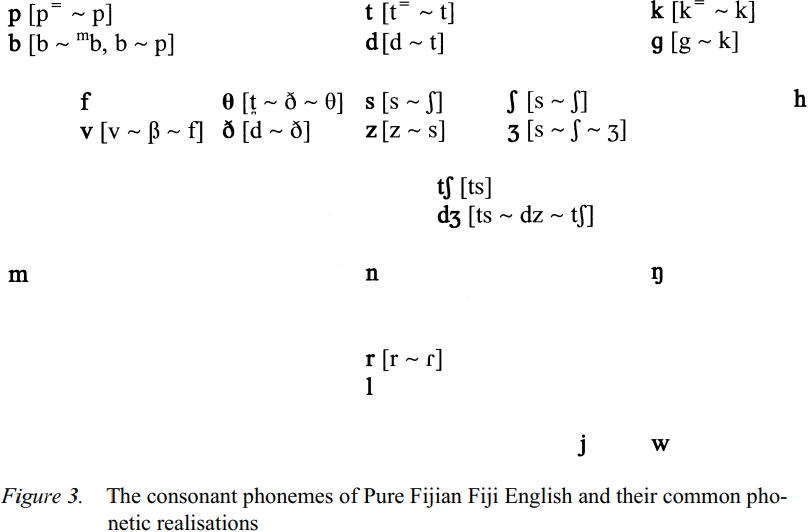


 Grammar
Grammar
 Tenses
Tenses
 Present
Present
 Past
Past
 Future
Future
 Parts Of Speech
Parts Of Speech
 Nouns
Nouns
 Verbs
Verbs
 Adverbs
Adverbs
 Adjectives
Adjectives
 Pronouns
Pronouns
 Pre Position
Pre Position
 Preposition by function
Preposition by function 
 Preposition by construction
Preposition by construction
 Conjunctions
Conjunctions
 Interjections
Interjections
 Grammar Rules
Grammar Rules
 Linguistics
Linguistics
 Semantics
Semantics
 Pragmatics
Pragmatics
 Reading Comprehension
Reading Comprehension|
Read More
Date: 2024-05-02
Date: 2024-04-12
Date: 2024-04-25
|
At the phonemic level, Pure Fijian English has a five vowel system, based on Fijian. In addition, the length and quality distinctions of standard varieties of English are neutralized. Most of the monophthongs of Pure Fiji English are tense but short, as opposed to Standard English tense/long versus lax/short. Examples include such items as: reach and rich > [rits]; beach and bitch > [bits]; march and much > [mats]; port and pot > [pɒt] , sport and spot > [spɒt] , caught/court and cot > [kɒt] (e.g. basketball court > [baskεtbɒl kɒt] ); fool and full > [ful]; and cloak and clock > [klɒk].

Evidence for this neutralization of length and quality is reflected in frequent pronunciation spellings in the local tabloids:
(1) a. Situations wanted: Baby seater available [...]. (Fiji Times, 23/2/1995)
b. A wife driving from a back-sit is comparable to a husband cooking from the dining room table. (Daily Post, 1/6/1999)
c. Naitasiri North’s sensational victory over giant Nadi upset the apple-cut. (Daily Post, 4/9/1995)
d. His face was a bit swollen and he also spotted a black eye. (Daily Post, 8/5/1995)
e. The roads of Labasa ... portholes are everywhere. (Fiji Times, 19/5/1999)
f. She told the Sun that most of her clients were top-class businessmen and police officers. “It is surprising that most of my customers are big shorts of our country.” (Fiji Sun, 4/12/1999)
g. Mr T. told prison offices to provide V. with 10 fullscap pages and a pen [...] (Fiji Times, 9/6/1999)
Fijian has eight diphthongs (/ai/, /ei/, /oi/, /ao/, /iu/, /eu/, /au/, /ou/), five of which (/ai/, /ei/, /oi/, /au/ and /ou/) are similar to the diphthongs of standard metropolitan English, and are often realized in Pure Fiji English as such. Nevertheless, they are sometimes instead realized as monophthongs by many speakers, especially the FACE, CHOICE and GOAT vowels. Fijian does not have any centring diphthongs like those in Standard English NEAR, SQUARE and CURE. These are realized in Pure Fiji English as monophthongs or falling diphthongs.
The following are descriptions of the most common variants of the Pure Fiji English vowels as articulated by Fijians. As stated above, there is considerable variation within this lect due to the speaker’s place of residence (largely rural vs. urban), competence as a speaker of Standard English, educational background and general exposure to standard metropolitan English. (Note that the lexical items in parentheses indicate those used in the accompanying recording of the lexical set. It was found that these words were more appropriate for the Fiji context.)
|
|
|
|
"عادة ليلية" قد تكون المفتاح للوقاية من الخرف
|
|
|
|
|
|
|
ممتص الصدمات: طريقة عمله وأهميته وأبرز علامات تلفه
|
|
|
|
|
|
|
ضمن أسبوع الإرشاد النفسي.. جامعة العميد تُقيم أنشطةً ثقافية وتطويرية لطلبتها
|
|
|